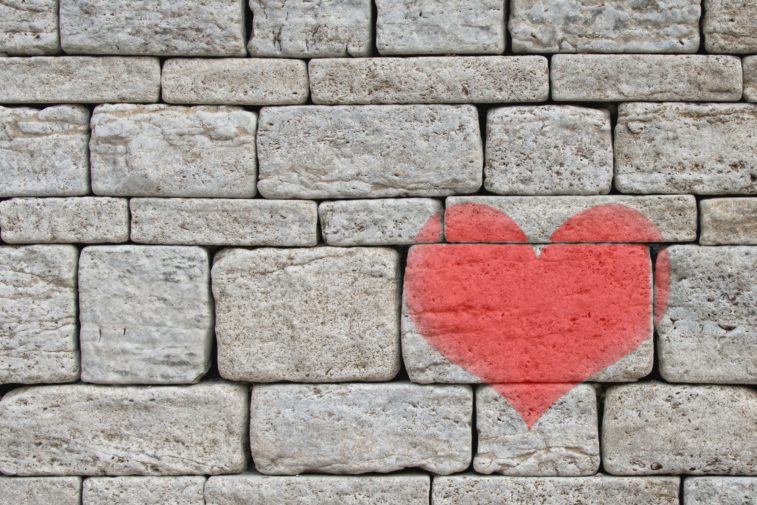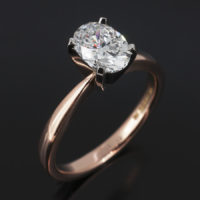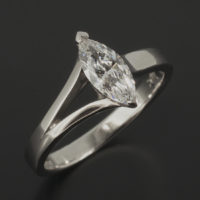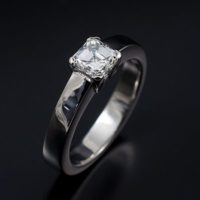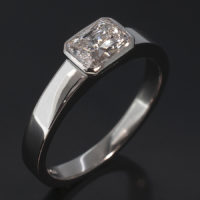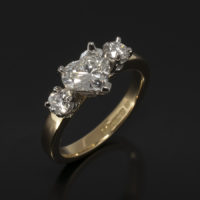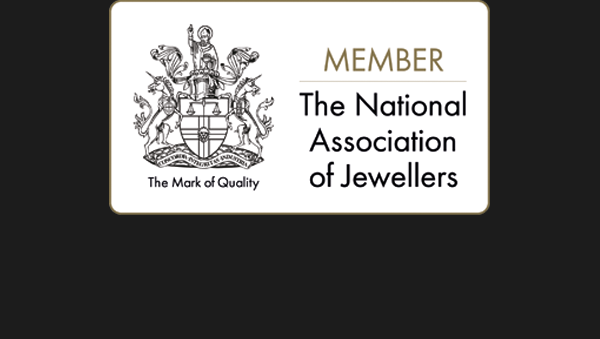KELVINBRIDGE · GLASGOW
|TEL 0141 334 0557
BOOK NOW FOR IN-HOUSE ONE TO ONE OR VIRTUAL/REMOTE CONSULTATIONS
The plus side to a heart of stone, our part II guide to diamond cuts reveals all
Our last blog post introduced you to five of the most popular stone cuts that are used in diamond engagement rings today. There are many factors to consider when looking for the perfect diamond for your design – the cut determines its proportions and ability to reflect light. Read our guide to diamond cuts to discover the characteristics and history of the remaining five shapes hopefully giving you an insight to which might be ‘the one’ for you…
Oval Cut
Longer in shape but with similar sparkle to Round Cut, the Oval Cut is considered slightly ‘softer’ in its look creating an elegant finish to any ring design. An Oval Cut diamond can seem larger than round stones of the same carat weight due to its drawn out symmetrical appearance and large surface area.
* Perhaps the most famous Oval Cut stone rests on the hand of Kate Middleton. Once belonging to the late Princess Diana, the instantly recognizable blue Oval Cut Sapphire halo ring was presented to Kate by Prince William upon their engagement in 2010.
Marquise Cut
The distinctive almond-shaped Marquise Cut diamond has the largest surface area of all the cuts making the diamond appear larger than it actually is regardless of carat size. Sometimes referred to as ‘navette’ diamond (meaning ‘little ship’ in French – due to its boat-like shape), Marquise Cut stones hold an old world elegance which works superbly well in a vintage design engagement ring.
* To mark his love for his mistress Jean Antoinette Poisson – the Marchioness Madame de Pompadour – King Louis XV commissioned a diamond resembling the shape of her lips. Hailing back to 18th century France, this famous stone cut became known as the Marquise.
Asscher Cut
Dating back to the turn of the 20th century, the Asscher Cut was first introduced by Dutch diamond cutter (or ‘cleaver’ as it was known at the time) Joseph Asscher. With similar qualities to an Emerald Cut, the Asscher Cut is always square and with larger stepped facets that produce a brilliance unlike any other shape of diamond. With a surge in popularity in the 1920s Asscher Cut diamonds are linked with art-deco and vintage style jewellery.
* One of the world’s most famous diamonds, the ‘Krupp Diamond’, was a 33.14 carat Asscher Cut which belonged to Elizabeth Taylor. The diamond was gifted to her by Richard Burton in 1968 costing $307,000 and subsequently set in her engagement ring. Upon her death, the stone was renamed the ‘Elizabeth Taylor Diamond’ and was sold at auction in 2011 for $8.8m.
Radiant Cut
Generally square or rectangular, Radiant Cut diamonds are known for their exceptional sparkle making them a superb choice for engagement rings. Having only been around for about 40 years, this cut of diamond is relatively new on the scene. With its straight sides and beveled corners, Radiant Cut diamonds offer a little more modern feel than similar shaped Princess and Cushion Cuts.
* Inventor of the Radiant Cut, Henry Grossbard, came to America as a 16 year old having been freed from a Nazi camp in occupied France, 1941. Being introduced to the diamond business by family members in the US, Henry devoted his life to learning his craft and worked well into his 70s in the industry.
Heart Cut
The uniqueness of Heart Cut diamonds is achieved by labour intensive techniques and comprehensive cutting skills making it an extravagant stone of choice. With references present in 17th Century paintings, literature and Royal history; Heart Cut diamonds have long been considered the discernable token of eternal love and romance.
* Once gifted by Royalty as a sign of friendship, Queen Elizabeth received a ring set with a heart shaped diamond from Mary Queen of Scots in 1562 making it one of the most famous diamonds in history.
CATEGORIES
Archives
- October 2025
- June 2025
- April 2025
- March 2025
- December 2024
- November 2024
- August 2024
- June 2024
- May 2024
- March 2024
- February 2024
- January 2024
- December 2023
- November 2023
- August 2023
- June 2023
- April 2023
- February 2023
- December 2022
- August 2022
- July 2022
- May 2022
- April 2022
- January 2022
- November 2021
- September 2021
- June 2021
- April 2021
- November 2020
- August 2020
- April 2020
- March 2020
- February 2020
- January 2020
- May 2019
- March 2019
- October 2018
- May 2017
- April 2017
- March 2017
- February 2017
- January 2017
- March 2016
- October 2015
- June 2015
- May 2015
- April 2015
- March 2015
- February 2015
Recent Posts
- Bespoke wedding rings from Blair and Sheridan – your love story comes full circle
- Adding colour to our craft: introducing coloured diamonds and gemstones to your bespoke jewellery
- Bespoke diamond engagement rings don’t have to cost the earth…
- Planning your wedding – it’s all in the detail
- The best things come in threes…. a guide to bespoke trilogy rings
CONTACT US
- Blair and Sheridan
- Bespoke Diamond Jewellers Glasgow
- 417 Great Western Road
- Kelvinbridge
- Glasgow G4 9JA
- T: 0141 334 0557
- E: info@blairandsheridan.co.uk
RECENT NEWS
COPYRIGHT © 2018 BLAIR AND SHERIDAN | BESPOKE DIAMOND JEWELLERS GLASGOW, SCOTLAND SC 412681 VAT No. GB 131 6499 13 | Terms & Conditions | Privacy Policy | Contact Us

